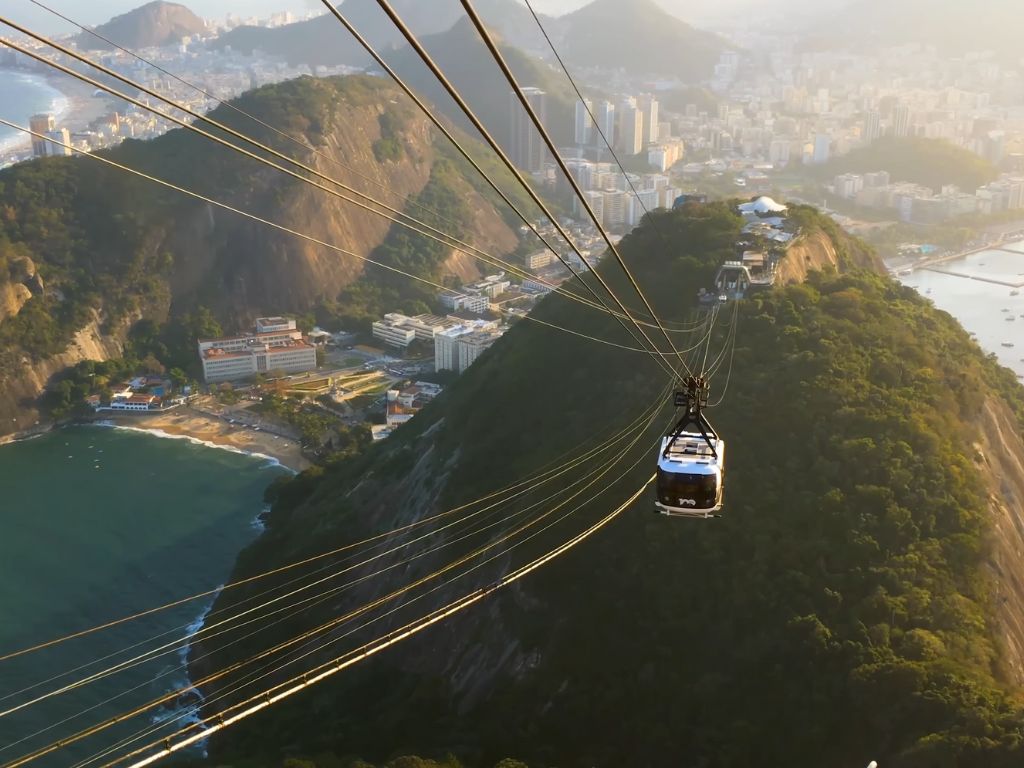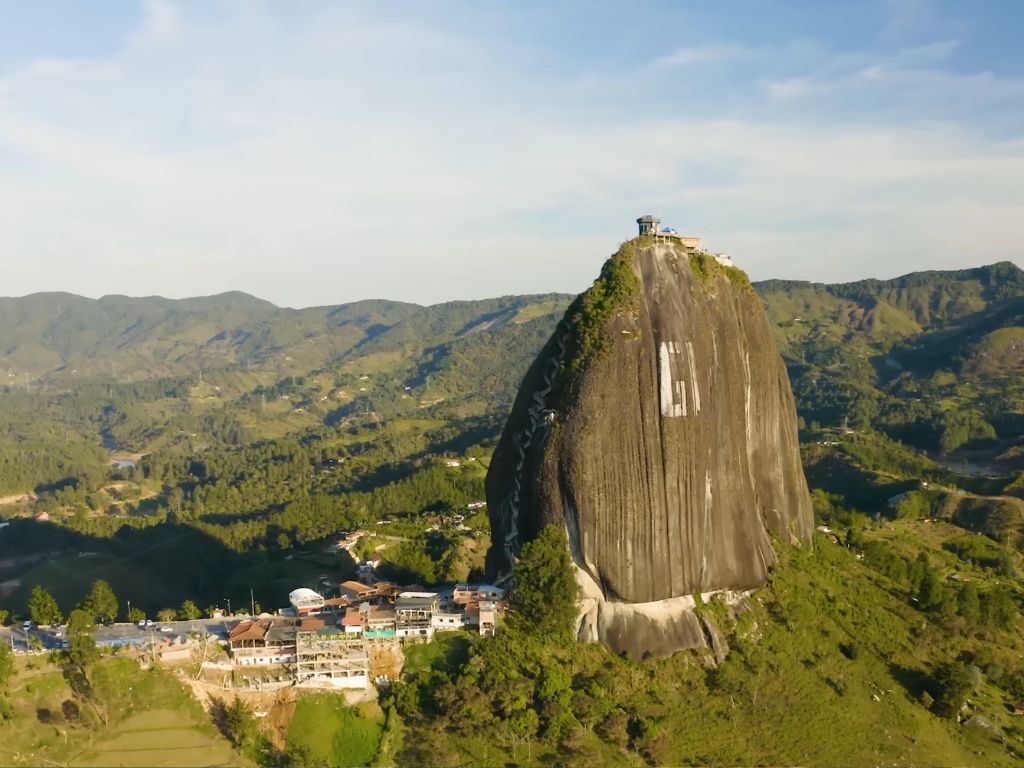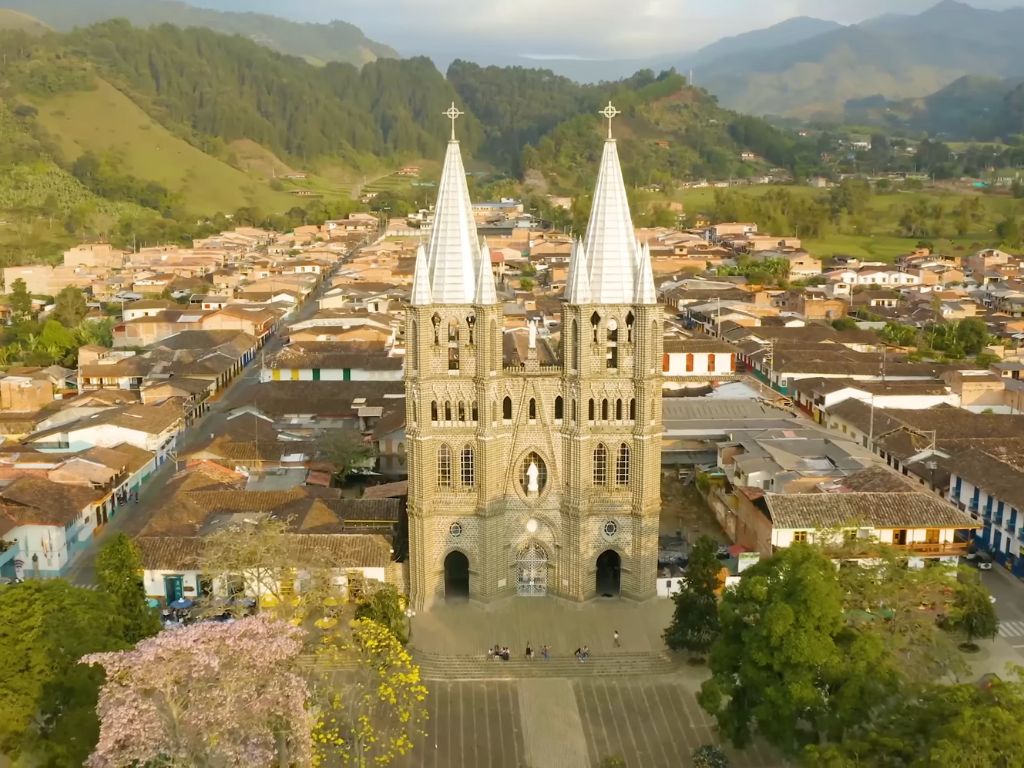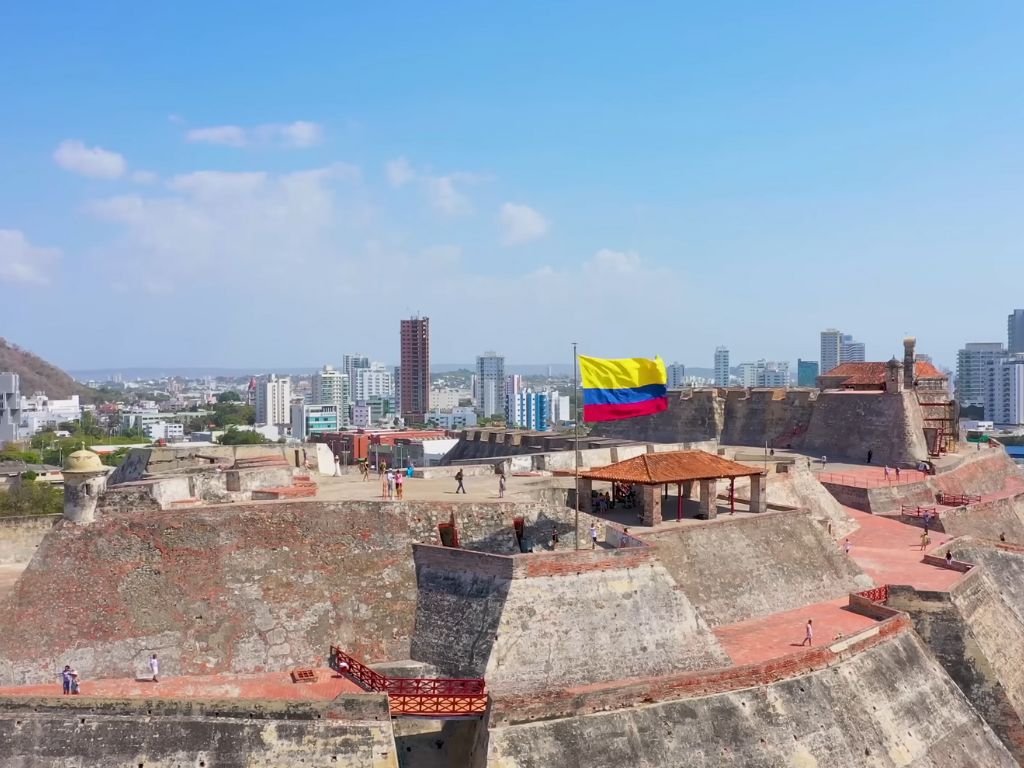Did you know the U.S. Department of State gives Colombia a Level 3 advisory? This means travelers should be very cautious because of safety risks.
Colombia is known for its beautiful spots, lively culture, and deep history. However, visitors must be careful and prepare well for their journey to make it safe and fun.
Key Takeaways:
- Colombia has a Level 3 travel advisory from the U.S. Department of State.
- Travelers are advised to reconsider travel to Colombia due to crime and terrorism.
- Violent crime, civil unrest, and kidnappings are prevalent in Colombia.
- Terrorist groups and criminal organizations target transportation hubs and government facilities.
- Protests and road closures are common, and demonstrations can turn violent.

Safety Tips for Traveling in Colombia
Colombia is full of adventure and culture, but staying safe is key. There are some important tips to keep in mind for a secure trip:
- Stay Informed and Adjust Your Plans: Keep an eye on the news and travel alerts. Know about any issues that might affect your plans. It’s smart to understand the current situation in the places you’ll visit.
- Avoid Protest Areas and Crowds: Protests in Colombia are often linked to politics or the economy. They can get dangerous, causing traffic and transport problems. Keep safe by staying away from these areas and avoiding large groups of people.
- Maintain a Low Profile and Stay Aware: It’s best to travel quietly and pay attention to what’s happening around you. Don’t show off valuable things and watch your stuff. Always be on the lookout for anything strange and follow your gut feelings.
- Enroll in the Smart Traveler Enrollment Program (STEP): The STEP program keeps U.S. travelers updated on safety info. It’s free and offers help in emergencies. Signing up can bring peace of mind during your trip.
- Review Country Security Report and Prepare a Contingency Plan: Read over Colombia’s safety report before you leave. Be aware of the risks and have a plan for anything that could go wrong. Being ready makes facing unexpected situations easier.
- Avoid High-Risk Areas: Some parts of Colombia are best avoided because of high crime and terrorism. Areas like Arauca, Cauca, and Norte de Santander are risky. It’s also not safe at the Colombia-Venezuela border due to crime and the risk of getting held in Venezuela.
Following these safety tips will make your time in Colombia more secure and fun. Keeping informed, being careful, and looking after yourself are the most important things when you travel.
Crime and Safety Precautions in Colombia

Going to Colombia means knowing about the crime and keeping safe. It’s important to know what to do to stay secure. Here are some key points to remember:
- Be cautious of crime hotspots: Some areas have higher crime rates, especially for tourists or rich-looking people. It’s smart to avoid risky places and stay where many others are.
- Exercise caution with dating apps: Some crimes, like robberies and even killings, have happened via dating apps. To stay safe, be careful when talking to new people online. Always meet in a public place.
- Take care when using ATMs: Colombia has seen fraud at ATMs. Use machines in safe places and always hide your PIN. Be alert at all times.
- Use caution when using taxis: Taking street taxis can be risky. It’s safer to pick official taxis or trusted ridesharing services. If you need a street taxi, get advice from your hotel or a local.
- Beware of disabling drugs: Some criminals might use drugs to harm or rob you. Don’t accept food or drink from people you don’t know well. Keep an eye on your stuff and avoid risky situations.
- Exercise caution with spiritual cleansing products: Some products are sold as a way to clean your spirit, but they can be dangerous. It’s better not to buy or use them.
- Be vigilant against internet scams: Scams happen online too, in both love and money matters. Be careful if someone you meet online asks for cash or personal info. Always be suspicious of these requests.
Remember these tips on crime and safety while traveling in Colombia. And don’t forget to check travel warnings and talk to local officials or the U.S. Embassy if you’re worried.
| Crime Precautions | Safety Tips |
|---|---|
| Avoid crime hotspots | Exercise caution in high-risk areas |
| Be cautious of dating app risks | Arrange meetings in public places |
| Use secure ATMs | Choose ATMs in well-lit areas |
| Take authorized taxis | Use reputable ride-sharing services |
| Beware of disabling drugs | Be cautious of accepting drinks/food from strangers |
| Avoid traditional hallucinogens | Steer clear of substances marketed as “spiritual cleansing” |
| Be vigilant against internet scams | Exercise caution when engaging in online relationships or financial transactions |
Demonstrations and Travel Disruptions in Colombia

Colombia is full of life with a vibrant culture and rich history. But, travelers should know about possible demonstrations. These can cause travel problems in the country.
Demonstrations happen a lot in Colombia, often due to politics or the economy. They can close roads and stop public transport. This affects how both tourists and locals can move around.
It’s key for travelers to keep an eye on local news for updates about traffic and protests. They should stay away from these areas. They can get dangerous fast, with risks of severe injury or even death.
By knowing what’s happening and following local advice, travelers can reduce how much they’re affected by these problems. Planning other ways to get around is smart to avoid the demonstration areas.
Also, signing up for the Smart Traveler Enrollment Program (STEP) by the U.S. Department of State is a good idea. This program sends travelers updates on the situation in Colombia. It can help them be ready and change their plans if needed.
While these problems can be tough, they shouldn’t stop you from seeing Colombia’s beauty and culture. With the right planning and caution, travelers can safely enjoy Colombia despite these situations.
| Type of Disruption | Impact |
|---|---|
| Road closures | Can hinder travel and lead to diversions |
| Public transportation disruptions | May affect access to buses, trains, and other modes of transport |
| Protests turning violent | Potential for injuries and fatalities |
Assistance and Reporting Crime in Colombia

If you’re in Colombia and have an emergency, knowing where to get help is key for U.S. citizens. You should contact the United States Embassy in Bogota first. It’s the main help point, but for folks on the coast, the Consular Agency in Barranquilla is there to help too.
If you see a crime or feel unsafe, report it fast to the local police. Doing this helps keep everyone safer in that area. Don’t forget you can always ask the U.S. Embassy for help and advice too.
The Embassy does a lot to help U.S. citizens in Colombia. They can point you to good healthcare if you’re sick or hurt. Plus, they help with reporting crimes, getting in touch with your loved ones, and finding lawyers or programs that help crime victims.
For U.S. citizens facing domestic violence or sexual assault, the Embassy is here to help. If you’re in trouble, reach out to them right away.
It’s smart to keep the U.S. Embassy and Consular Agency’s contact info handy. This way, you’re ready for any emergency.
| Emergency Contacts | Contact Information |
|---|---|
| U.S. Embassy in Bogota | +57-1-275-2000 |
| Consular Agency in Barranquilla | +57-5-353-2001 |
Conclusion
When planning a trip to Colombia, your safety should be a top priority. It’s vital to know the latest travel advice and safety measures. By keeping up with the travel advisory colombia from the U.S. Department of State, you can stay safe.
Avoiding high-crime and terrorist areas is wise. This includes places with civil unrest. Colombia safety tips, like blending in, being alert, and dodging big gatherings, are crucial for your safety.
Signing up for the Smart Traveler Enrollment Program (STEP) is a smart move. It helps you get emergency alerts and support. It’s also important to have a plan for any surprises and to check security updates often. This can help you deal with Colombia’s specific safety issues better.
With caution and watchfulness, your Colombia trip can be both safe and rewarding. Just remember to follow the safety advice at all times.
FAQ
What is the current travel advisory for Colombia?
The U.S. Department of State has set a Level 3 travel advisory for Colombia. This advises U.S. citizens to think twice about traveling there. It mentions the risks from crime, terrorism, civil unrest, and kidnapping.
What are the safety tips for traveling in Colombia?
Here are some tips for staying safe in Colombia. Watch local news for updates. Stay away from protests and large groups. Keep a low profile. Sign up with the Smart Traveler Enrollment Program (STEP). Also, read up on the country’s security report.
What are the crime and safety precautions in Colombia?
Be careful in Colombia, as crime is common. Robberies and homicides happen a lot there. Use caution with dating apps, ATMs, and taxis. You should be careful about substances like scopolamine.
And be cautious with traditional drugs that are called “spiritual cleansing.” Watch out for scams, especially online. They mention internet romance and financial scams.
How do demonstrations impact travel in Colombia?
Demonstrations happen often in Colombia. They can close roads and disrupt travel. These protests sometimes get violent. They might cause deaths or injuries.
Avoid protest areas and keep up with local news for travel warnings. It’s important to know what’s going on to stay safe.
How can I get assistance and report crimes in Colombia?
If you’re a U.S. citizen in trouble in Colombia, contact the U.S. Embassy in Bogota or the Consular Agency in Barranquilla. The Embassy can help with medical care, crime reports, and contacting your family or lawyers. They also assist victims of domestic violence or sexual assault.
What precautions should I take while traveling in Colombia?
Traveling to Colombia means being careful and informed. Know the latest travel advisories and safety tips. Stay away from risky areas. Follow the U.S. Department of State’s advice closely.
Being cautious and alert can help ensure a safe trip to Colombia.
Source Links
- https://travel.state.gov/content/travel/en/traveladvisories/traveladvisories/colombia-travel-advisory.html
- https://travel.state.gov/content/travel/en/international-travel/International-Travel-Country-Information-Pages/Colombia.html
- https://co.usembassy.gov/security-alert-reminder-of-the-continued-threat-of-crime-in-colombia/
